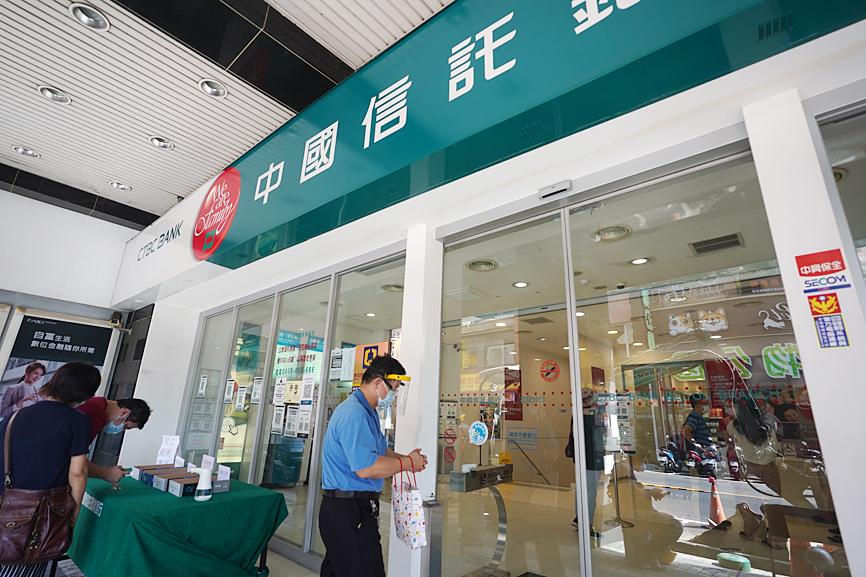CTBC Bank (中國信託銀行) yesterday reported an annual increase in New Taiwan dollar-denominated loans and net fee income in the second quarter, despite the local COVID-19 outbreak.
The banking arm and main profit engine of CTBC Financial Holding Co (中信金控) reported that its NT dollar-denominated corporate loans, mortgages and unsecured consumer loans rose annually by 21.7 percent to NT$692 billion (US$24.73 billion), 11 percent to NT$798 billion and 18 percent to NT$193 billion respectively.
OVERSEAS BRANCHES

Photo: CNA
In contrast, the bank’s foreign currency-denominated lending fell 9 percent year-on-year to NT$930 billion, as its overseas branches were more conservative about approving new loans amid the COVID-19 pandemic, it told an investors’ conference.
The bank’s net interest margin, a gauge of its profitability, was 1.39 percent last quarter, flat from a quarter earlier, but down from 1.44 percent a year earlier, while its non-performing loan ratio dropped from 0.48 percent a quarter earlier to 0.4 percent as of the end of June, company data showed.
FEE INCOME
The bank’s net fee income expanded 11.8 percent annually to NT$8.03 billion, as fee income from its wealth management business and corporate banking grew 24.8 percent to NT$4.27 billion and 22 percent to NT$939 million respectively, offsetting declines reported by its credit card and consumer banking businesses.
VOUCHER PROGRAM
Asked about how the government’s proposed “quintuple stimulus voucher” program would boost the local economy, CTBC Financial said it estimated that the program would trigger additional consumption of NT$120 billion, which would help raise the nation’s GDP by 0.4 to 0.5 percent.
However, as the vouchers would reportedly be distributed in October, they might have less of an effect on the economy than last year’s Triple Stimulus Vouchers, which were distributed in July, a peak spending season, CTBC Financial spokeswoman Chiu Ya-ling (邱雅玲) said.

Semiconductor shares in China surged yesterday after Reuters reported the US had ordered chipmaking giant Taiwan Semiconductor Manufacturing Co (TSMC, 台積電) to halt shipments of advanced chips to Chinese customers, which investors believe could accelerate Beijing’s self-reliance efforts. TSMC yesterday started to suspend shipments of certain sophisticated chips to some Chinese clients after receiving a letter from the US Department of Commerce imposing export restrictions on those products, Reuters reported on Sunday, citing an unnamed source. The US imposed export restrictions on TSMC’s 7-nanometer or more advanced designs, Reuters reported. Investors figured that would encourage authorities to support China’s industry and bought shares

FLEXIBLE: Taiwan can develop its own ground station equipment, and has highly competitive manufacturers and suppliers with diversified production, the MOEA said The Ministry of Economic Affairs (MOEA) yesterday disputed reports that suppliers to US-based Space Exploration Technologies Corp (SpaceX) had been asked to move production out of Taiwan. Reuters had reported on Tuesday last week that Elon Musk-owned SpaceX had asked their manufacturers to produce outside of Taiwan given geopolitical risks and that at least one Taiwanese supplier had been pushed to relocate production to Vietnam. SpaceX’s requests place a renewed focus on the contentious relationship Musk has had with Taiwan, especially after he said last year that Taiwan is an “integral part” of China, sparking sharp criticism from Taiwanese authorities. The ministry said

US President Joe Biden’s administration is racing to complete CHIPS and Science Act agreements with companies such as Intel Corp and Samsung Electronics Co, aiming to shore up one of its signature initiatives before US president-elect Donald Trump enters the White House. The US Department of Commerce has allocated more than 90 percent of the US$39 billion in grants under the act, a landmark law enacted in 2022 designed to rebuild the domestic chip industry. However, the agency has only announced one binding agreement so far. The next two months would prove critical for more than 20 companies still in the process

CHANGING JAPAN: Nvidia-powered AI services over cellular networks ‘will result in an artificial intelligence grid that runs across Japan,’ Nvidia’s Jensen Huang said Softbank Group Corp would be the first to build a supercomputer with chips using Nvidia Corp’s new Blackwell design, a demonstration of the Japanese company’s ambitions to catch up on artificial intelligence (AI). The group’s telecom unit, Softbank Corp, plans to build Japan’s most powerful AI supercomputer to support local services, it said. That computer would be based on Nvidia’s DGX B200 product, which combines computer processors with so-called AI accelerator chips. A follow-up effort will feature Grace Blackwell, a more advanced version, the company said. The announcement indicates that Softbank Group, which until early 2019 owned 4.9 percent of Nvidia, has secured a